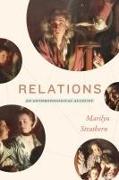- Start
- Relations
Relations
Angebote / Angebote:
In RELATIONS, Marilyn Strathern offers a deep and sustained analysis of the concept "relations." Strathern traces the English language use of the term through the centuries, showing that up until the eighteenth century, relations had been limited to describing logic and epistemology and had not been used as a reference to kin (or any other social relations). As Strathern traces the historical shift and the way this reflected emerging ideas about learning and new forms of kinship, she also weaves analysis relating to knowledge-making, comparison, and social science criticism. Strathern explores these themes in eight chapters, each with their own substantive focus, but which when read together offer diverse yet interconnected reflections on the theoretical expansiveness of the concept. In weaving together analysis of kin-making and knowledge-making, she opens up new ways of thinking about the contours (and limits) of epistemic and relational possibilities of the English-speaking world. In chapter 1, Strathern analyzes how relations emerge within contexts of debate and conversation. This functions as a model to imagine what types of connections and associations emerge as a result of what Strathern calls "knowledge exchanges." This leads her to analyze the relationship between anthropologists and the communities and to raise questions about the limit of ethnographic methods and knowledge-making. The final chapter, chapter 8, is concerned with the relationships between anthropologists and scholars in other disciplines, as well as the relationship between anthropology as a discipline and other disciplines. This chapter generates critical questions about the particular tools that emerge from an anthropological discussion of relations and, more specifically, an English-speaking discussion of relations. Here, Strathern suggests that English-speaking anthropologists can use relations as an analytic to better understand their disciplinary conventions, as well as think beyond these conventions to generate more critical analyses. This project will be of interest to students and scholars of anthropology and social theory"--
Folgt in ca. 15 Arbeitstagen
